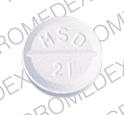Cogentin
Generic name: benztropine (oral/injection) [ BENZ-troe-peen ]
Drug class: Anticholinergic antiparkinson agents
The Cogentin brand name has been discontinued in the U.S. If generic versions of this product have been approved by the FDA, there may be generic equivalents available.
What is Cogentin?
Cogentin is used with other medicines to treat symptoms of Parkinson's disease, such as stiffness or tremors.
Cogentin is also used to treat Parkinson-like symptoms caused by using certain medicines.
Cogentin may also be used for purposes not listed in this medication guide.
Cogentin side effects
Get emergency medical help if you have signs of an allergic reaction: hives; difficulty breathing; swelling of your face, lips, tongue, or throat.
Cogentin may cause serious side effects. Call your doctor at once if you have:
-
dry mouth that causes trouble talking or swallowing;
-
little or no urination;
-
uncontrolled muscle movements;
-
vomiting, severe constipation;
-
fast heartbeats;
-
muscle weakness;
-
blurred vision, tunnel vision, eye pain, or seeing halos around lights;
-
confusion, hallucinations; or
-
severe skin rash.
Common side effects of Cogentin may include:
-
dry mouth;
-
blurred vision;
-
constipation; or
-
nausea.
This is not a complete list of side effects and others may occur. Call your doctor for medical advice about side effects. You may report side effects to FDA at 1-800-FDA-1088.
Related/similar drugs
Warnings
Use only as directed. Tell your doctor if you use other medicines or have other medical conditions or allergies.
Before taking this medicine
You should not use Cogentin if you are allergic to it.
Not approved for use by anyone younger than 3 years old.
Tell your doctor if you have ever had:
-
urination problems;
-
glaucoma; or
-
muscle problems.
Older adults may be more sensitive to the effects of Cogentin.
It is not known if Cogentin will harm an unborn baby. Tell your doctor if you are pregnant or plan to become pregnant.
Tell your doctor if you are breastfeeding.
How should I take Cogentin?
Follow all directions on your prescription label and read all medication guides or instruction sheets. Your doctor may occasionally change your dose. Use the medicine exactly as directed.
Cogentin oral is taken by mouth.
Cogentin is usually taken at bedtime.
Cogentin injection is given in a muscle or vein if you are unable to take the medicine by mouth.
Drink plenty of water to prevent dry mouth while taking Cogentin.
Dry mouth may lead to gum disease or cavities. Brush and floss your teeth regularly and visit your dentist for routine dental care.
Call your doctor if your symptoms do not improve, or if they get worse.
Your symptoms may get worse if you stop using Cogentin suddenly. Ask your doctor before stopping any of your anti-Parkinson medications.
Store at room temperature away from moisture, heat, and light.
What happens if I miss a dose?
Take the medicine as soon as you can, but skip the missed dose if it is almost time for your next dose. Do not take two doses at one time.
What happens if I overdose?
Seek emergency medical attention or call the Poison Help line at 1-800-222-1222.
Overdose may cause drowsiness, confusion, nervousness, hallucinations, fast heart rate, vomiting, numbness in your fingers, hot or dry skin, or fainting.
What should I avoid while taking Cogentin?
Avoid driving or hazardous activity until you know how Cogentin will affect you. Your reactions could be impaired.
Avoid becoming overheated or dehydrated during exercise and in hot weather. Cogentin can decrease sweating and you may be more prone to heat stroke.
What other drugs will affect Cogentin?
Tell your doctor about all your other medicines, especially:
-
other medicine to treat Parkinson's disease;
-
medicine to treat depression, anxiety, mood disorders, or mental illness;
-
cold or allergy medicine (Benadryl and others);
-
medicine to treat stomach problems, motion sickness, or irritable bowel syndrome;
-
medicine to treat overactive bladder; or
-
bronchodilator asthma medication.
This list is not complete. Other drugs may affect Cogentin, including prescription and over-the-counter medicines, vitamins, and herbal products. Not all possible drug interactions are listed here.
More about Cogentin (benztropine)
- Check interactions
- Compare alternatives
- Reviews (10)
- Drug images
- Side effects
- Dosage information
- During pregnancy
- Drug class: anticholinergic antiparkinson agents
- Breastfeeding
Patient resources
Professional resources
Related treatment guides
Further information
Remember, keep this and all other medicines out of the reach of children, never share your medicines with others, and use this medication only for the indication prescribed.
Always consult your healthcare provider to ensure the information displayed on this page applies to your personal circumstances.
Copyright 1996-2024 Cerner Multum, Inc. Version: 11.01.

